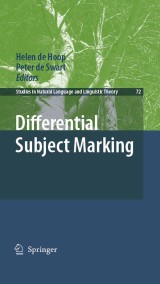Details

Differential Subject Marking
Studies in Natural Language and Linguistic Theory, Band 72
|
213,99 € |
|
| Verlag: | Springer |
| Format: | |
| Veröffentl.: | 04.12.2007 |
| ISBN/EAN: | 9781402064975 |
| Sprache: | englisch |
| Anzahl Seiten: | 308 |
Dieses eBook enthält ein Wasserzeichen.
Beschreibungen
<P>Although (almost) all sentences have subjects, not all sentences encode their subjects in the same way. Some languages overtly mark some subjects, but not others, depending on certain features of the subject argument or the sentence in which the subject figures. This phenomenon is known as Differential Subject Marking (DSM). Languages differ in which conditions govern DSM. Some languages differentiate their subjects on the basis of semantic features of the argument such as thematic role, volitionality, animacy, whereas others differentiate on the basis of clausal features such as tense/aspect and the main/dependent clause distinction. DSM comes in different formal guises: case marking, agreement, inverse systems, and voice alternations.</P>
<P>Relatively much is known about cross-linguistic variation in the marking of subjects, yet little attempt has been made to formalize the facts. This volume aims to unify formal approaches to language and presents both specific case studies of DSM and theoretical approaches.</P>
<P>Relatively much is known about cross-linguistic variation in the marking of subjects, yet little attempt has been made to formalize the facts. This volume aims to unify formal approaches to language and presents both specific case studies of DSM and theoretical approaches.</P>
Cross-linguistic Variation in Differential Subject Marking.- Differential Subject Marking at Argument Structure, Syntax, and PF.- Quantitative Variation in Korean Case Ellipsis: Implications for Case Theory.- Ergative Case-marking in Hindi.- DOM and Two Types of DSM in Turkish.- Differential Subject Marking in Polish: The Case of Genitive vs. Nominative Subjects in “X was not at Y”-constructions.- Differential Argument Marking in Two-term Case Systems and its Implications for the General Theory of Case Marking.- Non-canonical Agent Marking in Agul.- From Topic to Subject Marking: Implications for a Typology of Subject Marking.- Grammaticalization and Strategies in Resolving Subject Marking Paradoxes: The Case of Tsimshianic.- Different Subjects, Different Marking.- Differential Marking of Intransitive Subjects in Kambera (Austronesian).
<P>Although (almost) all sentences have subjects, not all sentences encode their subjects in the same way. Some languages overtly mark some subjects, but not others, depending on certain features of the subject argument or the sentence in which the subject figures. This phenomenon is known as Differential Subject Marking (DSM). Languages differ in which conditions govern DSM. Some languages differentiate their subjects on the basis of semantic features of the argument such as thematic role, volitionality, animacy, whereas others differentiate on the basis of clausal features such as tense/aspect and the main/dependent clause distinction. DSM comes in different formal guises: case marking, agreement, inverse systems, and voice alternations.</P>
<P></P>
<P>Relatively much is known about cross-linguistic variation in the marking of subjects, yet little attempt has been made to formalize the facts. This volume aims to unify formal approaches to language and presents both specific case studies of DSM and theoretical approaches.</P>
<P></P>
<P>Relatively much is known about cross-linguistic variation in the marking of subjects, yet little attempt has been made to formalize the facts. This volume aims to unify formal approaches to language and presents both specific case studies of DSM and theoretical approaches.</P>
Contains numerous illuminating discussions of Differential Subject Marking from languages all over the world Provides an important step forwards in our understanding the complex nature of Differential Subject Marking (complex as compared to Differential Object Marking) Shows that Differential Subject Marking is often the result of interactions between conflicting constraints on language use

















